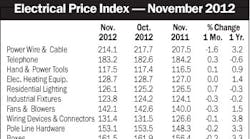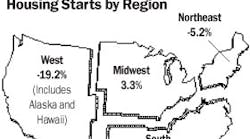One of the worse steel shortages in history is squeezing electrical manufacturers still struggling to recover from the electrical wholesaling industry’s three-year economic slump.
Many manufacturers and reps are calling the steel crisis the worst they have seen in their careers, or at least since a similar steel spike in 1973 and 1974. Mark Magno, vice president of marketing for Wheatland Tube Co., Collingswood, N.J., said the current steel crisis is worse than the one in the 1970s because this time skyrocketing prices and shortage of materials are being reported around the world.
“Our company has been in business for 127 years and clearly this is the worst we have seen,” he said.
In an open letter to the industry, Wheatland Tube said that what makes the steel shortage unique is, “There is no one component part driving the current condition.” The letter said a shortage exists of almost all raw materials used in pipe and tubular products, including iron ore, coking coal, scrap steel and direct reduced iron or hot briquetted iron pellets.
According to the electrical manufacturers EM interviewed, other factors for the price increase include strong foreign demand, most notably from China, for hot-rolled steel (a basic sheet product used by many industries); improved domestic demand for hot-rolled steel; high ocean freight rates for imported steel; a weak U.S. dollar that makes imports more costly; and the continuing consolidation of U.S. steel manufacturers.
Steel prices are expected to keep surging, and some steel customers expect prices for hot-rolled steel to hit $500 to $600 a ton next month, up from about $330 in January.
“From what we are hearing from our steel suppliers, $600 per ton sometime in the second quarter is well within the realm of possibilities,” said Bill Curley, vice president, sales and marketing, electrical conduit for Republic Conduit, Chesterfield, Mo. “As for an end in sight to price increases, it’s not possible to predict when the peak will be reached, or if or when prices will fall.”
Of particular concern to electrical manufacturers is the uncertainty over availability and prices of the raw materials to produce their steel products. Several manufacturers told EM they had no choice but to pass on the price increases to their reps and distributors. Manufacturers, who are unable to predict steel prices from week to week, have been forced to pass along the price increases of up to 30 percent to 50 percent to other companies along the supply chain.
“It’s pretty insane right now and part of it is just because the manufacturer doesn’t have an idea what his cost is going to be,” said Douglas Carlson, principal, C&O Electric Sales Co., a manufacturers’ rep in Overland Park, Kan.
“You hear of steel companies quoting price in effect at time of shipment,” said one manufacturer. “One of our reps in a major metropolitan market said the price of pipe has doubled in his market in the last year.” There have also been reports of manufacturers placing some customers on allocation, a practice that has not occurred for some time.
Many manufacturers have stopped taking orders for the month of March. Whatever orders are placed in March will be shipped in April. Jim Amey, principal, Robert A. Amey Co. in Portland, Ore., urges distributors to stay calm. “People are panicking,” he said. “They are thinking a memo might come out saying we’re not taking orders for shipments in March. All that means is that the production in March is taken and the orders taken today are going to be shipped in April. Is that a problem? No. It’s a problem for the people who buy short and buy for today’s needs. You just need to expand your transit time or should we say ‘order cycle time.’ Or you look at it longer term.” Amey cautions distributors not to hoard steel.
One manufacturer recently implemented a three-tier pricing system where customers are charged by the size of the order. While Republic Conduit did not originate a three-tier pricing system, according to Curley, the company embraced it because in addition to increased steel prices, the cost of transportation and energy have also increased product cost.
“The implementation of new work rules by the Department of Transportation (DOT) increased the cost of transportation in many areas (driving time, loading time, extra charges per drop-off, etc.) We embraced this extra tier because it will help offset the extra cost of handling multiple orders per truckload as well as higher transaction cost for pulling together multiple releases,” he said.
Some manufacturers have had to cut back on production. “We are doing our best to continue to operate our facilities and balance our inventories to provide some levels of customer service to our customers,” said Wheatland Tube’s Magno. “Sometimes that means instead of running our factories five and six days a week, we’ve had to pull them back to four days a week to try to conserve steel. It doesn’t do us as a manufacturer any good to run seven days a week and then have steel shipments not arrive and then not be able to support the business because our steel didn’t come in.”
In almost all cases, manufacturers said they are not selling to new customers at this time and they are evaluating orders first to see whether they have enough steel to cover the orders. “We are, similar to other people, not accepting new customers,” said Magno. “When we are evaluating an order, it’s just as important to know what sizes and type of product are on that order and see how that matches up with our inventory or incoming steel. And clearly we’re looking at past purchasing practices from our customers and making sure that is in line to what they are asking for.”
Other manufacturers, like Hubbell Electrical Products’ Raco brand, are filling all distributor orders, but evaluating them carefully to ensure an equitable distribution of product, said Don Brody, vice president of sales, Hubbell Electrical Products.
While customers don’t like the increased steel costs, most seem to understand the reasons and the need for them, said several manufacturers. “I think unlike some past steel-related issues, this one has been reasonably publicized in the national press. Just in the past week we have seen articles in the Wall Street Journal, USA Today and a radio report on National Public Radio. It doesn’t get much more national than that,” said Magno.

